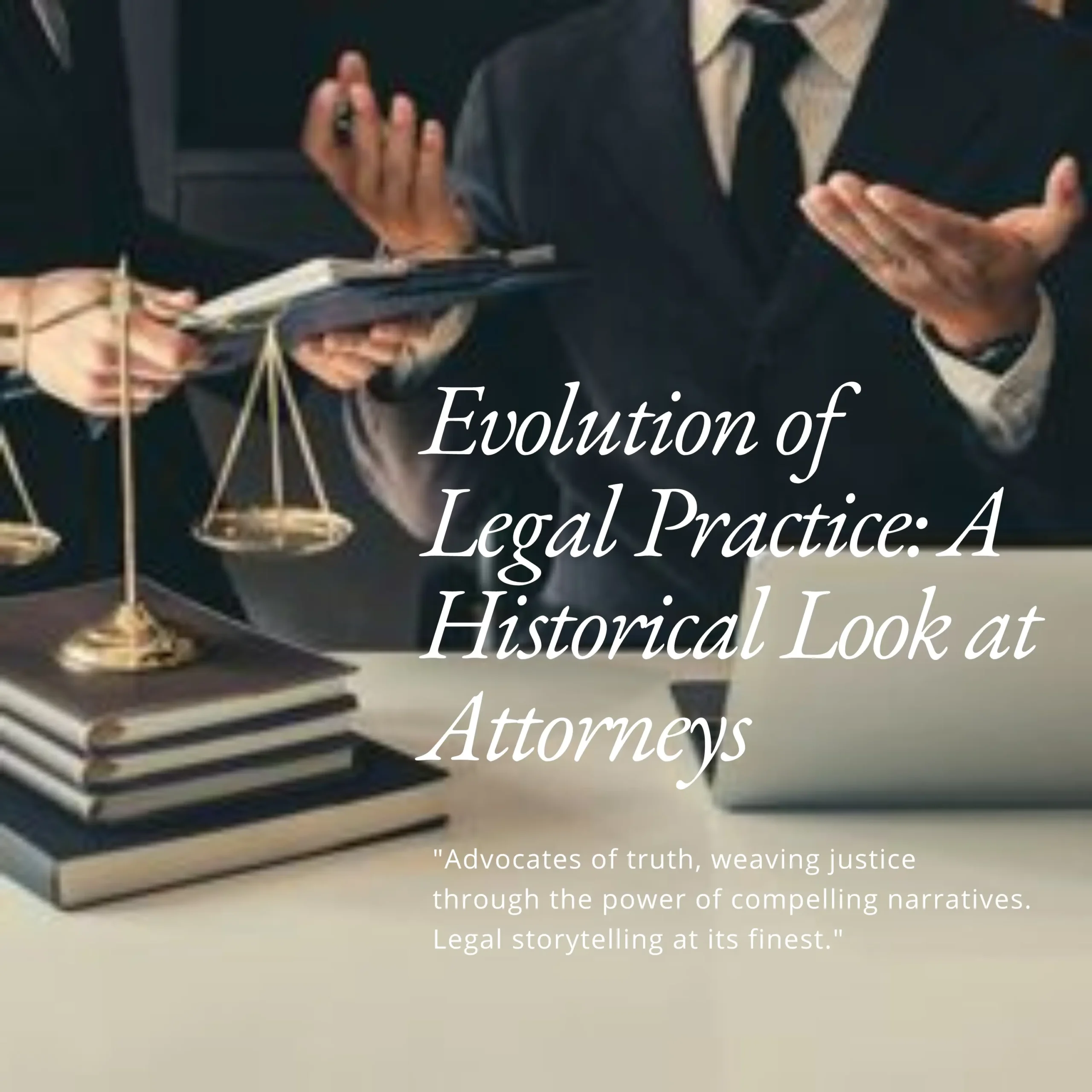Introduction
Law’s interesting development throughout millennia mirrors human societies and governments. They have influenced laws, advocated for justice, and represented people and groups throughout this evolution as attorneys. We examine attorneys from prehistoric times to their modern legal roles. The history of legal practice, from ancient civilizations to current lawyers protecting justice and fairness.
I. Ancient Origins of Legal Practice
Legal Practice Genesis Mesopotamian, Egyptian, and Indian rulers and religious leaders established norms of behavior and judicial systems, resulting in legal practice. Early attorneys, usually wise men or elders, advised and resolved disputes using traditional methods.
1. Mesopotamian Legal Systems
Civilization began in Mesopotamia, where legal practice developed alongside complex societies. The 1754 BCE Code of Hammurabi is one of the oldest legal systems. Babylonian King Hammurabi designed it to control commerce, property, marriage, and crime. To demonstrate the necessity for written legal codes to resolve disputes, these laws were etched on a stele and displayed.
2. Traditional Egyptian Law
Religion and social order shaped ancient Egyptian legal procedures. Truth, justice, and order underpinned the legal system. Priests and scribes used religious rules from the Book of the Dead and Thoth’s wisdom and writing instructions. Ancient Egyptian judges mediated disagreements wherever possible to promote reconciliation and atonement.
3. Ancient Indian Legal Systems
Ancient Indian law is thousands of years old. The Hindu sacred texts Dharmashastra, Manusmriti, and Arthashastra constituted the legal system. Brahmin intellectuals and jurists implemented these governance, family, property, and criminal justice principles. Dharma and peace were promoted by arbitrating legal disputes.
4. The Legal Advisor
Ancient civilizations used law beyond courts to various aspects of daily life. Sages, wise men, and elders—legal advisors—were respected in their society. They interpreted laws, advised monarchs and people, and handled disputes according to norms. Their judgments impacted society and preserved order, and their knowledge and impartiality were valued.
5. legal evolution
Egyptian, Mesopotamian and Indian legal systems affected others. Commerce, conquest, and cultural interaction changed laws. Written legal codes, professional judges, and specialist legal professions replaced informal arbitration and religious authority in ancient and classical civilizations.
II. Classical Age Legal System Development
Ancient Greek and Roman law impacted Western law. The Twelve Tables in Rome and Solon and Draco in Greece built the legal foundations that exist today. Roman “advocati” were courtroom attorneys who defended clients’ rights.
1. Greek Legal Systems
Solon and Draco impacted Western law. Solon championed legal reforms, including debt relief and democracy, in Athens. Although harsh, Draco’s law code was an early attempt to regulate society.
2. Roman Legal Legacy
The Twelve Tables founded Western legal systems. The Twelve Tables formalized Roman justice, property, and family law around 450 BCE. A legal system helped Romans resolve disagreements and govern social activity.
3. Ancient Roman “advocati” defended clients in court. These attorneys seek good court results for their clients. Advocates professionalized ancient Roman law.
4. Ancient Greek and Roman legal systems influenced Western law. The rule of law, legal equality, and individual rights emerged in these ancient civilizations and influenced modern legal systems. Western legal systems were influenced by Solon and Draco and Roman Empire legal advances.
III. Mediaeval and Common Law
Medieval feudalism governed Europe, and feudal courts determined legal matters. Common law, based on court precedents and custom, was a great English achievement. Barristers, called “barristers” and “solicitors,” began specializing in client advocacy in these courts, creating the legal profession.
1. Feudalism and Legal Disputes
Mediaeval Europe was dominated by feudalism. Feudal rulers governed territory and vassals, causing legal disputes. Lords or local authorities presided over feudal courts, which settled disputes and administered justice according to customary standards and feudal obligations.
2. English Common Law
Court precedents and customary practices created common law in medieval England. Common law was developed statewide on judges’ opinions.
IV. Legal Humanism, Renaissance
Law and legal theory gained interest throughout the Renaissance. The focus on reason and justice by legal humanists affected European legal thought. Attorneys were skilled specialists at this period.
1. Renaissance Legal Studies European law and legal philosophy flourished from the 14th to 17th centuries. The rebirth of classical learning and humanism was cultural.
2. Renaissance legal humanists valued reason, justice, and old law. According to Francesco Petrarch and Andrea Alciato, legal studies should return to Roman law’s roots for critical and scholarly study.
3. Renaissance scholars promoted legal thought through jurisprudence, ethics, and political philosophy. Niccolò Machiavelli’s “The Prince” and Thomas More’s “Utopia” influenced the intellectual atmosphere by examining law, governance, and social order.
4. Renaissance legal practice professionalization. Lawyers gained respect for their skills. This modified personal relationships or position-based informal legal representation.
V. Enlightenment and Law Reform
Enlightenment questioned authority and advocated individual rights and liberties. CEB pushed for torture eradication and criminal justice reform. Lawyers interpreted and applied modern legal systems based on codification, fairness, and rationality.
1. In the 17th and 18th centuries, the Age of Enlightenment promoted rational inquiry, individualism, and distrust of institutions. Voltaire, Locke, and Rousseau advocated law, liberty, and equality.
2. Legal Reformers and Individual Rights
Cesare Beccaria and other Enlightenment legal reformers opposed authoritarian legal regimes and supported individual liberties. In his landmark work “On Crimes and Punishments,” Beccaria condemned torture and arbitrary punishment and supported deterrence and rehabilitation-based sentencing.
VI. Industrialization and Law Practice Growth
The Industrial Revolution urbanized and industrialized society. Conflicts over labor, property, and contracts grew. Specialized lawyers and large legal firms created bar associations.
VII. Globalisation in the 20th century
In the 20th century, lawyers specialized. Globalization enhanced multinational law firms and services. International arbitration, cross-border business, and transnational issues needed attorneys to negotiate numerous legal systems and cultures.
1. Legal specialisation
Legal specialization increased in the 20th century. Attorneys specialize in corporate, IP, environmental, and family law. This expertise lets solicitors offer more tailored and effective legal services.
2. Global law firms
Globalization transformed the legal landscape, resulting in global law firms with offices worldwide. These businesses’ legal services were employed by multinational corporations, governments, and international traders. Multinational law firms globalized legal services and increased attorney collaboration.
VIII. Digital Age Opportunities and Challenges
Technology has changed legal research, client communication, and case administration. Online legal research and e-discovery technologies have streamlined processes but raised privacy and security concerns. These improvements have not assured justice for all, especially underprivileged groups.
1. Technology Changed Legal Practice
The internet has revolutionized how lawyers research, communicate, and manage cases. Digital tools and platforms have increased efficiency, streamlined procedures, and expanded attorneys’ services.
2. Technology and Legal Research
Online databases and research platforms provide attorneys access to enormous legal archives and precedents. This accessibility helps attorneys get relevant case law, statutes, and academic information quickly.
3. Client Communication
Technology streamlines attorney-client communication. Attorneys inform clients, answer questions, and collaborate remotely using email, video conferencing, and secure messaging.
4. Software and digital technologies have changed attorney case administration and organization. Practice management tools and online platforms let solicitors arrange paperwork, track deadlines, and collaborate in real time.
5. Data Security and Privacy
Technology has benefited the legal profession but also raised data security and privacy concerns. E-discovery tools and online research databases must be safe to protect client data and comply with data protection rules.
6. Access to Justice Issues Legal technology has enhanced access to justice, yet marginalized individuals still encounter difficulties. Marginalized persons struggle with legal representation and system navigation due to the digital divide, unequal technological access, and limited resources.
IX. Law Practice Future
Legal practice may change due to several factors. AI, machine learning, alternative dispute resolution, and professional diversity and inclusion are examples. Fairness and ethics must be balanced by solicitors.
1. Integration of AI and Machine Learning
AI and machine learning will transform legal practice. These technologies might automate contract review and document analysis, saving law firms and clients time and money.
2. Alternative Dispute Resolution Mechanisms
Mediation and arbitration may replace litigation. ADR is faster and cheaper than courtroom litigation, thus attorneys must be proficient at using it and representing clients.
3. Diversity & Inclusion
Lawyers are representing more women, minorities, LGBTQ+ individuals, and other disadvantaged groups. Legal firms recognize that diversity fosters creativity, equity, and better client service.
Conclusion
Legal practice has developed to reflect society’s goal of justice and fairness. Lawyers have influenced laws, protected rights, and supported the law. While the legal profession advances, honesty, professionalism, and service must be maintained to keep justice accessible.


2 thoughts on “Evolution of Legal Practice: A Historical Look at Attorneys”